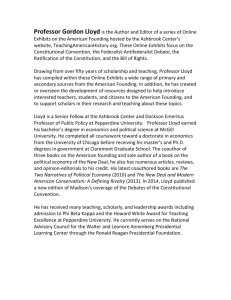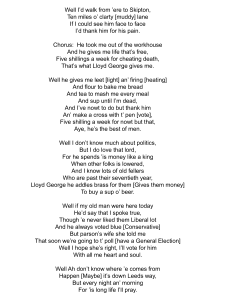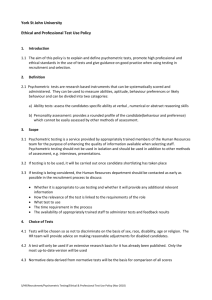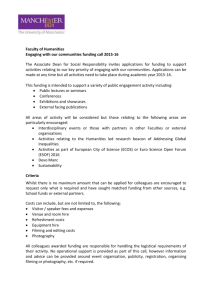КР ІЗДН Документознавство та інформаційна діяльність 5 курс, 9
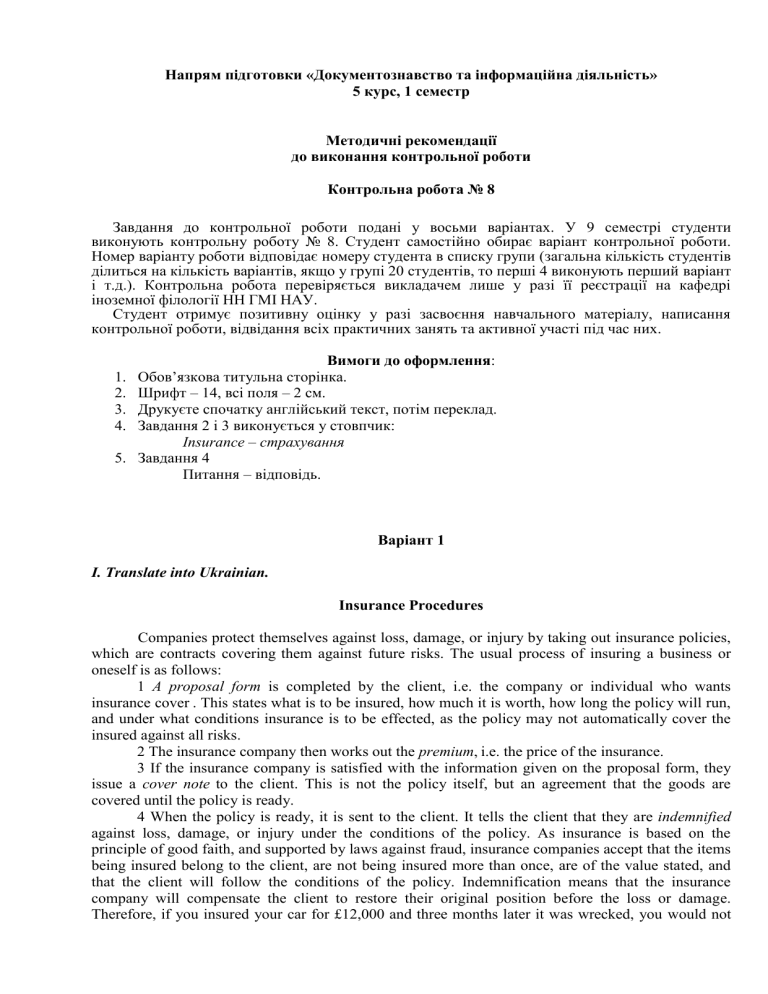
Напрям підготовки «Документознавство та інформаційна діяльність»
5 курс, 1 семестр
Методичні рекомендації до виконання контрольної роботи
Контрольна робота № 8
Завдання до контрольної роботи подані у восьми варіантах. У 9 семестрі студенти виконують контрольну роботу № 8. Студент самостійно обирає варіант контрольної роботи.
Номер варіанту роботи відповідає номеру студента в списку групи (загальна кількість студентів ділиться на кількість варіантів, якщо у групі 20 студентів, то перші 4 виконують перший варіант і т.д.). Контрольна робота перевіряється викладачем лише у разі її реєстрації на кафедрі іноземної філології НН ГМІ НАУ.
Студент отримує позитивну оцінку у разі засвоєння навчального матеріалу, написання контрольної роботи, відвідання всіх практичних занять та активної участі під час них.
Вимоги до оформлення
:
1.
Обов’язкова титульна сторінка.
2.
Шрифт – 14, всі поля – 2 см.
3.
Друкуєте спочатку англійський текст, потім переклад.
4.
Завдання 2 i 3 виконується у стовпчик:
Insurance – страхування
5.
Завдання 4
Питання – відповідь.
Варіант 1
I. Translate into Ukrainian.
Insurance Procedures
Companies protect themselves against loss, damage, or injury by taking out insurance policies, which are contracts covering them against future risks. The usual process of insuring a business or oneself is as follows:
1 A proposal form is completed by the client, i.e. the company or individual who wants insurance cover . This states what is to be insured, how much it is worth, how long the policy will run, and under what conditions insurance is to be effected, as the policy may not automatically cover the insured against all risks.
2 The insurance company then works out the premium , i.e. the price of the insurance.
3 If the insurance company is satisfied with the information given on the proposal form, they issue a cover note to the client. This is not the policy itself, but an agreement that the goods are covered until the policy is ready.
4 When the policy is ready, it is sent to the client. It tells the client that they are indemnified against loss, damage, or injury under the conditions of the policy. As insurance is based on the principle of good faith, and supported by laws against fraud, insurance companies accept that the items being insured belong to the client, are not being insured more than once, are of the value stated, and that the client will follow the conditions of the policy. Indemnification means that the insurance company will compensate the client to restore their original position before the loss or damage.
Therefore, if you insured your car for £12,000 and three months later it was wrecked, you would not
receive £12,000, but the market price of the car if it had not been damaged. For example, it might have depreciated by 20% to £9,600. The insurance company will also have the right of subrogation , which means they can now claim the wrecked vehicle and sell it for any price they can get. However, insurance companies also offer policies which cover goods at their original prices or may replace the item.
In the case of injury or death, or life assurance, the principle of benefit payment operates. The injured person (or their dependants if they are killed) is paid compensation. The life assurance beneficiary is paid according to his or her contributions and interest earned on investment.
Insurance companies are large institutional investors on the stock market, and by investing premiums they are able to cover claims for compensation and pay matured life assurance policies.
Fire and Accident Insurance
Fire insurance
Fire insurance companies offer three main types of policy:
1. Insurance of home and business premises and their contents.
2. Special perils policies , which protect the client against loss or damage due to special factors, e. g. floods or earthquakes
3. Consequential loss insurance , which means insurance against losing money as a consequence of an accident, e.g. when a company is unable to produce goods because of fire damage to their factory.
II. Suggest the Ukrainian equivalents of the phrases below: proposal form; the principle of good faith; it might have depreciated by 20% to £ 9,600; stock market; special peril policy; to claim the wrecked vehicle; to pay matured life assurance; to restore original position; original price.
III. Find English equivalents to the following words and phrases from the text: розмір страхової відповідальності; страховий внесок; тимчасове свідоцтво про страхування, коверкот; суброгація ( страх.) перехід прав застрахованого до страхувальника; відшкодувати збитки; бенефіціарій (одержувач грошей по страховому полісу); відшкодування збитків; обман, шахрайство; автомобіль, що зазнав аварії; виплачувати компенсацію; страхування життя; ризик; виплата страхової суми; знецінюватися; страхування ризику втрат внаслідок якихось обставин.
IV. Answer the questions:
1. What types of policy do you know?
2. What does the policy indemnify the client against?
3. What is the insurance premium?
4. What is a cover note?
5. What does a proposal form state?
6. What does the right of subrogation mean?
7. What does the principle of good faith mean?
Варіант 2
I. Translate into Ukrainian.
Accident Insurance
Accident insurance covers four areas:
1. Insurance of liability , which covers employers' liabilities for industrial accidents, accidents to people attending functions on company business, and motor insurance.
2 . Property insurance, which is part of the service fire insurance companies provide, but also includes a wide range of protection against riots, terrorism, gas explosions, etc. Usually, the client takes out an all risks policy, which offers full protection.
3. Personal accident insurance , which offers compensation in the form of benefit payments to people injured (or their dependants if they are killed) on outings, in sporting accidents, or travelling by train, coach, or air.
4.
Insurance of interest , which protects companies against making costly mistakes. For example, publishers might want to cover themselves against libel, i.e. being sued for publishing something which damages someone's reputation. Accountants and lawyers also protect themselves with insurance of interest. Fidelity insurance can be included under this heading. These are used by companies to insure against their employees defrauding them or stealing from them.
Claims
Companies and individuals make claims for loss, damage, or accident by filling in a claim form, which tells the insurance company what has happened. If the insurers accept the claim, often after an inspection or investigation, they will pay compensation.
The insurance company will not pay compensation under the following conditions: if the claimant was negligent; if the claimant suffered the injury or loss outside the terms of the policy; or if the claimant misled the insurers when obtaining insurance, e.g. overvalued the article, insured the same thing twice, or gave false information on the proposal form.
The insurer may, of course, offer less compensation than the claimant is asking for. If the claimant disagrees with the offer, they can call in an independent assessor , and then, if necessary, take the case to court. But usually insurance companies are quite reasonable in their assessments, and small claims are sometimes paid without question.
II. Suggest the Ukrainian equivalents of the phrases below: all risks policy; to offer full protection; benefit payment; dependant; outing; insurance of interest; costly mistakes; to cover oneself against libel; to damage one’s reputation; to fill in a claim form; insurer; to suffer the injury or loss outside the terms of the policy; to mislead the insurer; to overvalue the article; to insure the same thing twice; to give false information on the proposal form; to call in an independent assessor; claimant; to be reasonable in one’s assessments; industrial accident; personal accident insurance; to take the case to court; property insurance; sporting accident.
III. Find English equivalents to the following phrases: страховий поліс; запрошувати незалежного експерта з оцінювання; ввести в оману страхувальника; страхуватися від наклепу (у пресі); страхування від нещасних випадків; поліс страхування від усіх ризиків; заповнити бланк претензії; нещасний випадок на виробництві; утриманець; страхування автомашини; виконувати функції; страхування відповідальності;
порушення громадського порядку, безчинство; страхування від фінансових ризиків, пов’язаних із зловживанням службовців; обманювати, відбирати (обманом); експерт з оцінки
(нерухомості); зазнати тілесного ушкодження чи втрати, що не підпадає під умови страхового полісу.
IV. Answer the questions:
1. What are the conditions under which the insurance company will not pay compensation?
2. What policy offers full protection?
3. In what cases is fidelity insurance used?
4. What does insurance of interest protect companies against?
5. What does insurance of liability cover?
6.What does personal insurance cover?
Варіант 3
I. Translate into Ukrainian.
Marine insurance
Lloyd's of London
Lloyd's of London is not an insurance company but an international insurance market consisting of insurance brokers and underwriters who are controlled by Lloyd's Council.
If insurance is to be arranged through a Lloyd's underwriter the transaction has to go through a
Lloyd's broker who, working for a commission, will contact underwriters on behalf of the client to get a competitive rate. Underwriters finance the insurance, which means they will pay the claims and take the premiums as their fees. They usually work in syndicates in order to spread the risk. Syndicates may cover marine insurance or non-marine insurance such as motor and aviation insurance, or life assurance.
Lloyd's is responsible for, or associated with, a number of publications:
—
Lloyd's List and Shipping Gazette, a daily newspaper read throughout the world, which gives details of shipping movements, sea and air accidents, fires, strikes, etc., and essential information concerning shipping and dry cargo markets.
—
Lloyd's Shipping Index offers daily details of the movements of merchant ships.
—
Lloyd's Loading List provides European exporters with information on cargo carriers to all parts of the world.
— Lloyd's Register of Shipping, though independent of Lloyd's, works closely with the organization to produce vessel classifications giving details of age, ownership, and tonnage.
Marine Insurance Policies
Generally, marine insurance is governed by the International Underwriting Association's ( IUA ' s) three main clauses
, called Institute Cargo Clauses. The most common is Clause A, which offers the broadest form of cover on an all-risk basis. This is the most expensive. Clauses B and C offer more limited cover and consequently are cheaper. If the policy is issued by Lloyds, there are also Lloyd's own clauses, which offer different types of cover at different rates. The client must read the clauses carefully to make sure that their particular cargo is covered against all the risks that the shipment might meet. These could include strikes, war, and piracy, as well as collision and sinking.
Value policies are based on the value of the invoice plus insurance and freight, with an extra percentage, e.g. 10%, on the value of the goods. There are also unvalued policies , where the value of the goods is not agreed in advance but assessed if loss should occur. This means the client will, if their goods are damaged or destroyed, get the market price as compensation. The owner of the bill of lading has the right to claim compensation.
Goods are usually insured for a voyage on an agreed value basis. However, if a client ships regularly with a given company, they might ask for an open cover policy , e.g. for twelve months. The premium would be agreed at the beginning and the client would declare each shipment, without limit on the number of shipments they make. Alternatively, the policy might accept all shipments without declarations. An initial payment would be charged and adjusted according to the number of shipments made over that period.
II. Suggest the Ukrainian equivalents of the words and phrases transaction; open cover policy; to pay the claim; to contact underwriters on behalf of the client; competitive rate; to cover marine insurance; valued policy; cargo carrier; to charge payment; to arrange the insurance; merchant ship; to claim compensation.
III. Find English equivalents to the following phrases: торгове судно; валютований поліс; відкритий (генеральний) поліс; страхувальник (як правило – морський); гонорар, плата за послуги; винагорода; задовольнити вимогу про відшкодування збитків; страхова премія; судна, морський флот; організувати страхування; невалютований поліс/
IV. Answer the questions:
1. What is Lloyd's of London?
2. What is the insurance procedure if it is arranged through a Lloyd's underwriter?
3. Why do underwriters work in syndicates?
4. What publications is Lloyd's associated with? What information do these publications ofter?
5. What is marine insurance governed by?
6. What is the difference between valued policies and unvalued policies?
7. What clause offers the broadest form of cover?
8. What are the advantages of an open cover policy? When a client may ask for it?
Варіант 4
I. Translate into Ukrainian.
Leadership
Organisational psychologists have also been involved in studying leadership. Much of the early research into leadership tended to look for particular people who had leadership 'qualities' − who automatically acted like leaders and took on leadership responsibilities when that sort of situation arose. Later, psychologists became more and more interested in the idea that effective leadership was actually a style of interacting with people, rather than a specific inherited personality trait.
Approaches to leadership became concerned with just how organisational leaders or managers influence the people in their working groups. Some theories have seen effective leaders as having preferred styles, which concentrate on either the job at hand, or on the people they are dealing with.
Task-oriented leaders are people who focus on the job which has to be done, whereas process-oriented ones are more concerned with making sure that everything in the group runs smoothly, and that people get along well together.
Interestingly, and contrary to what we might expect, the evidence suggests that processoriented leaders actually get more done in the end. Although the task-oriented leaders are only concerned with what needs to be done, they are less efficient overall because they allow tensions and resentments to build up in their teams, and in the end this means that people work less productively.
Process-oriented leaders, on the other hand, concentrate on making sure that people are reasonably happy with one another, and with what is going on, so that they are free to give their best efforts to the job.
This led to a focus on leadership as being all about the transactions which take place between manager and employee. Transactions are interpersonal exchanges between two people. Often these take the form of strokes: ritual greetings or enquiries which signal that the two people have recognised one another. A habitual 'good morning' exchanged between two people at a bus stop or tram station is a good example of a stroke. The words of the exchange are relatively unimportant, but the greeting signals that the two have acknowledged one another. As we have already seen, being recognised by other people matters to us, so the everyday strokes that we get from other people can be very important. We may not notice them much when they happen, but we certainly miss them if they do not.
The idea of transactional leadership is that effective leadership is essentially a joint thing, depending on both the manager and the employee. How effective a leader is depends on how both the leader and the employees interact. It does not just depend on the leader alone. After all, people will not co-operate with someone who does not seem to come up to scratch, so a leader who comes across as being ineffectual or incompetent is not going to be able to influence other people very much.
What this means is that a manager, consciously or unconsciously, negotiates his position with the employees. It is an interpersonal relationship, and their influence depends on being respected or valued. That is where the transactions come in. Strokes, for instance, can be either positive or negative: they can help us to feel good, or they can make us feel unhappy. Positive leaders look for ways of encouraging their staff to feel good – by recognising their achievements and helping them to get around difficulties. Negative leaders criticise their staff, and only notice mistakes rather than positive achievements. As decades of organisational psychology have taught us, it is not a method that gets the best out of people, but they do it anyway.
II. Suggest the Ukrainian equivalents of the phrases below: to have leadership qualities; to get along; to take on leadership responsibilities; inherited personality trait; task-oriented leaders; process-oriented leaders; to run smoothly; to get more done in the end; to give best efforts to the job; resentment; to make sure; interpersonal exchanges between people; interpersonal relationships; transaction; to come up to scratch; their influence depends on being respected or valued; to recognize achievements.
III. Find English equivalents to the following phrases: міжособистісні обміни між людьми; мати риси лідера; керівники, орієнтовані на виконання завдання; докладати усі зусилля на виконання роботи; брати на себе обов’язки керівника; проходити гладко; успадкована особиста риса; виявитися корисним; керівники, орієнтовані на процес; переконатися; керівництво, в основі якого лежить спілкування; міжособистісні обов’язки; подолати труднощі; запитання, розпитування; цінувати досягнення; напруга, напружений стан; добиватися найкращих результатів від людей; мати кращі результати наприкінці.
IV. Answer the question:
1.
What do task- and process-oriented leaders focus on in their job? Whose work is more efficient?
Why?
2.
What does the word “stroke” stand for? Give examples. Why are the strokes so important?
3.
Explain the term “transactional leadership”.
4.
Speak about positive and negative leaders.
Варіант 5
I. Translate into Ukrainian.
Choosing People for Jobs
Occupational psychology is concerned with selecting the right people for particular jobs, and with training and retraining systems to help people to learn new skills.
One of the main areas of occupational psychology is in the field of psychometric testing.
Psychometric tests are tests which are designed to assess some aspect of a person's psychology.
Sometimes they aim to assess how much someone knows, or what skills they have: sometimes they are concerned with personality, or intelligence, or some other character quality; and sometimes they are assessing what a person's potential might be – what particular aptitudes they have, and what sort of skills they might find easy to learn.
One thing which all psychologists agree on, though, is that no psychometric test is enough in itself. We should not base any decisions on the outcomes of psychometric tests alone, because they are not that definite. They can be useful, but they are not the whole answer − and if they are taken as absolute truth, then they can do more harm than good. What they actually do is to give us an indication of what the person is like, but that always has to be backed up by other information – their previous experience, other people's opinions, and what they themselves have to say.
Psychometric tests are used by occupational psychologists in a number of ways. One of these is in vocational guidance. People, who are contemplating a change of job, or a new career, often find it helpful to do a psychometric test which will help to identify what kinds of work they might do best. Of course, they still have to decide which out of several possibilities they actually want to do (if any), and then they have to acquire the relevant skills and experience to get the job; but a vocational guidance test can be a useful first step in making a career decision.
Psychometric tests are also used for job selection choosing the right person for the job. Again, they cannot be used on their own: a psychometric test is only one part of a range of information that needs to be taken into account in choosing the right person for a particular job. Sometimes, too, psychometric tests are used to help to select managers or technical staff for promotion. Those making the decision want to know whether someone will be able to cope with the demands of a new job, and use information from psychometric tests along with work records and managers' opinions to make the decision.
There are three types of occupational tests. The first of these are tests of general ability, which are usually intelligence tests of one form or another. These are really just to make sure that someone has a reasonable capacity for grasping what is expected of them.
The second major type of test is the personality test.
These tests are designed to identify personality characteristics which can influence how people interact with others at work, and how they approach the job. They might show, for instance, whether someone is mainly of a sociable disposition, or whether they tend to be quiet and introverted, keeping themselves to themselves.
The third major type of psychometric test which occupational psychologists use is ability and aptitude tests . Ability tests assess how skilled someone is at a particular type of task. For example, someone thinking of employing a secretary would usually ask them to type out a letter, so that they could see how capable they were at typing. Psychometric ability tests work on the same principle, but everything has been carefully standardised, so that we can compare people with different abilities effectively.
Aptitude tests do not assess existing skills. Instead, they assess how well someone would learn to do something. If a computer firm is taking on trainee, for instance, it would not make sense to ask them to program something, because they intend to train the person. Instead, they would give the person an aptitude test, which assessed whether that person could think in the way that is needed for good computer programming. Someone who could not think that way, clearly, would not be any good as a trainee. But just because someone could, does not mean they would be the right person. There are
other angles, too, like motivation and character, which would need to be evaluated at an interview and from the person's background. The test would be helpful, but not enough in itself.
We can see, then, that psychology has been involved in a great many different sides of working life. Organisational psychologists are involved in issues to do with human resource management, in understanding what motivates people at work, and in helping organisations to change their ways of working. Occupational psychologists are also involved in developing training systems and in the different aspects of personnel selection.
II. Suggest the Ukrainian equivalents of the phrases below: psychometric testing; intelligence test; personality test; to be concerned with; selecting/choosing the right people for particular jobs; training and retraining systems; to assess some aspects of a person’s psychology; they can do more harm than good; an indication of what the person is like; that has to be backed up by other information; previous experience; people, who are contemplating a change of job; to identify what kinds of work they might do best; to acquire the relevant skills and experience; information that needs to be taken into account; to make decision; to cope with the demands of a new job; work records; capacity for grasping what is expected of them; to identify personality characteristics; to make sense.
III. Find English equivalents to the following phrases: це має підтверджуватися іншою інформацією; набувати відповідні навички і досвід; упоратися з вимогами, пов’язаними з новою роботою; здатність зрозуміти, що від них очікують; мати сенс; займатися чимсь; вони можуть завдати більше шкоди, ніж користі; з’ясовувати, які види роботи вони могли б виконувати найкраще; інформація, яку необхідно враховувати; послужний список; визначити характерні риси особистості; відбір потрібних людей для певної роботи; вказівка на те, якою є людина; попередній досвід; приймати рішення; люди, які мають намір змінити роботу; оцінити деякі психологічні аспекти особистості; система підготовки та перепідготовки; психометричне тестування; перевірка розумових здібностей; перевірка рис характеру.
IV. Answer the questions:
1.
What is occupational psychology concerned with?
2.
What are the purposes of psychometric testing?
3.
What kind of information can be obtained by means of psychometric testing? Is this information sufficient?
4.
In what ways can psychometric tests be used?
5.
What types of occupational tests can you name?
6.
Write out information about different types of tests (intelligence, personality, ability and aptitude tests).
7.
What other methods of evaluating a person except the tests can be used?
8.
What other aspects of working life is psychology involved in?


